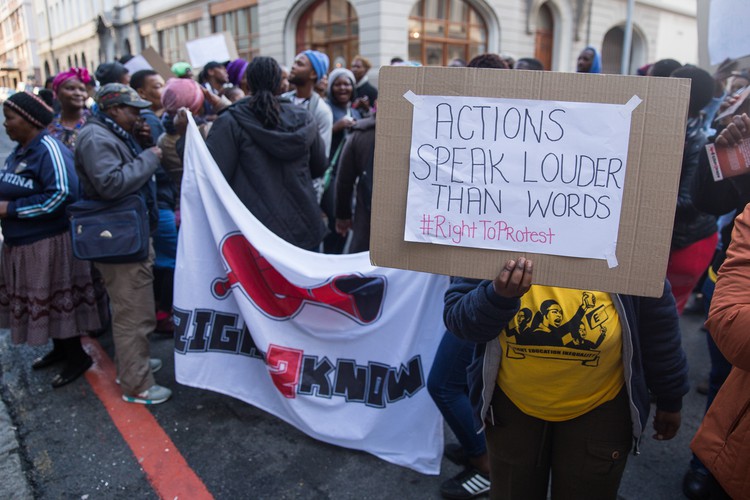Protest law under scrutiny in court
SJC argues that criminalising “peaceful” protesters is unconstitutional
The lawyer representing the Social Justice Coalition (SJC) in the case challenging a law criminalising protest has argued that sections of the Regulation of Gatherings Act are unconstitutional.
The matter, brought by the SJC against the Minister of Police, was heard in the Western Cape High Court on Wednesday. Equal Education, Open Society Justice Initiative and The UN Special Rapporteur were admitted as friends of the court (amicus curiae).
This follows the arrest of 21 SJC members and supporters who were arrested and charged with contravening the Regulation of Gatherings Act in September 2013. The group had staged a peaceful protest outside the civic centre in Cape Town. They chained themselves to the railing of the building in an attempt to get get the attention of Mayor Patricia de Lille.
According to the Act, gatherings with more than 15 people are required to submit a notice to protest to the City. The SJC members did not do this.
In February 2015, 10 members of the group fingered as the conveners of the protest were convicted under the Act. The remaining 11 were acquitted.
“They exercised their rights to protest, now have criminal records. The results of that criminal record is that it places a stigma and the ability to work, enter professions, travel,” said Advocate Michael Bishop for the SJC. He argued that the criminalisation of the failure to give notice for peaceful and non-disruptive gathering was unconstitutional.
Bishop said that while the group’s protest number was slightly above the legal limit, there was neither violence nor disruptions. He said that the state should find alternative ways to hold people accountable such as “civil liability.”
“Criminalising is easy … Not just easy, effective as well,” said Judge Thandazwa Nditha.
The SJC’s heads of argument stated that the availability of a civil remedy was important as it provided a “strong incentive for conveners to take all reasonable steps to ensure that the gatherings do not cause damage.”
Nditha questioned whether this remedy would become a problem when people or conveners were unable to foot the bill for the civil liability claims.
Equal Education’s lawyer Thembalihle Sidaki told the court that learners often had to deal with the long term effects of having criminal records for participating in school protests. During their argument, Judge Ndithi made reference to a learner who had been awarded a scholarship, but had to forfeit it because of their criminal record.
Advocate Geoff Budlender for the Open Society Justice Initiative said the Act penalised conveners heavily and that with social media everyone had became a convener.
Outside court, supporters from different organisations held up posters and sang struggle songs in support of the group.
The matter continues today. Some of the court papers are available on the SJC website.
Support independent journalism
Donate using Payfast

Don't miss out on the latest news
We respect your privacy, and promise we won't spam you.
Next: Paddling across Cape Town
Previous: South Africa is making progress against its most deadly disease
© 2017 GroundUp. 
This article is licensed under a Creative Commons Attribution-NoDerivatives 4.0 International License.
You may republish this article, so long as you credit the authors and GroundUp, and do not change the text. Please include a link back to the original article.

